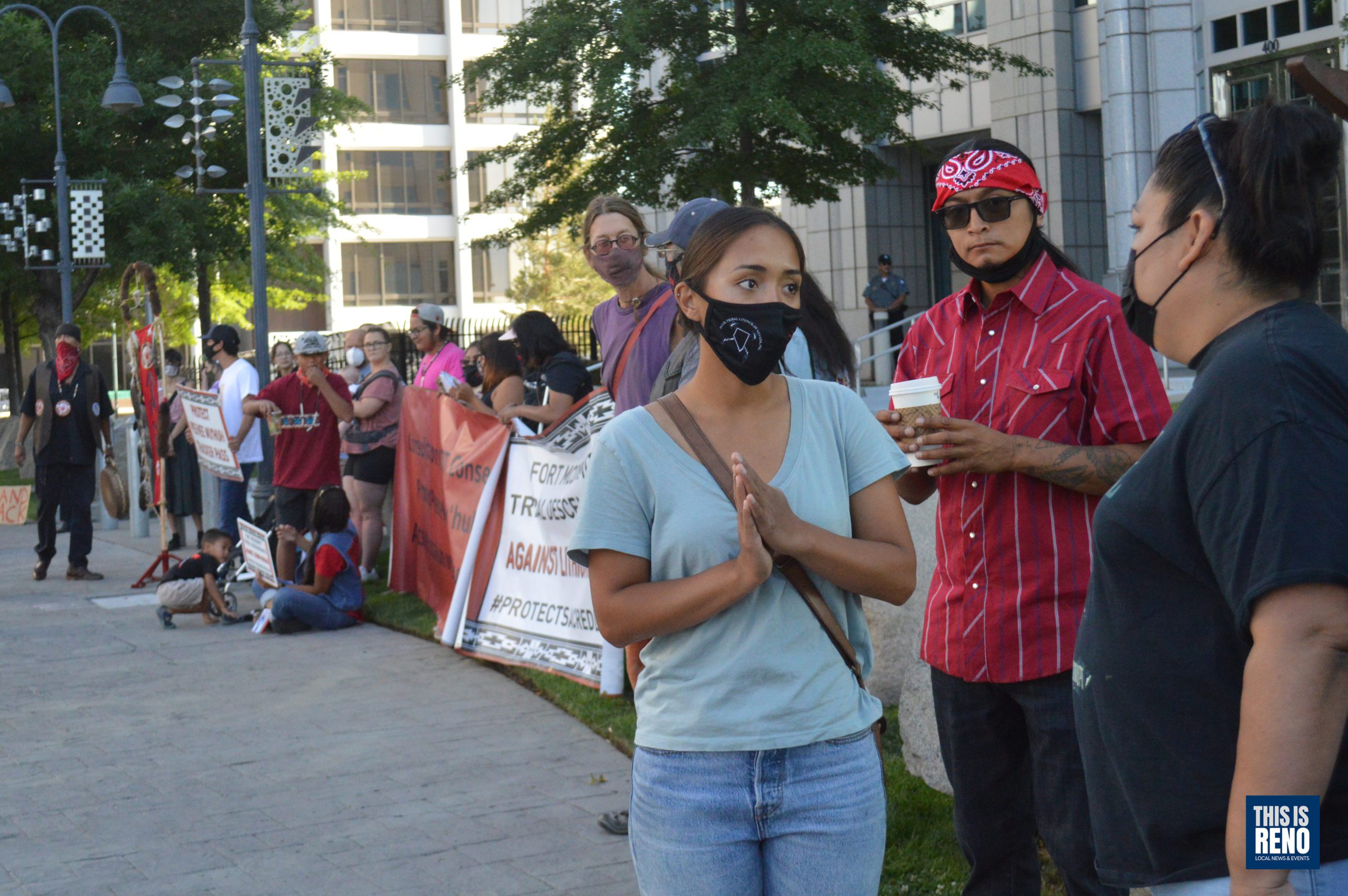Drums beat for hours outside of the Federal Courthouse on Virginia Street Wednesday morning as dozens of Indigenous people and others gathered to demonstrate against a planned lithium mine in the northernmost part of Nevada.
Two lawsuits were filed earlier this spring in an attempt to stop the mine, which was approved during the final days of the Trump presidency. Inside the courthouse, Judge Miranda Du heard oral arguments in one of the cases. The plaintiffs asked for an injunction to stop progress on the proposed mine, which has been in its planning stages for a decade.
The mine planned for Thacker Pass, 35 miles south of the Oregon-Nevada border, would be massive.
According to the operations plan of the company behind it, Canada-based Lithium Americas, the Thacker Pass project would include an open pit mine approximately 2.3 miles long and a half a mile wide. It could remove more than 17 million tons of rock and ore per year and might pump up to 1.7 billion gallons of water per year from surrounding aquifers.
Tribal members and other residents of the area are concerned about pollution and the destruction of culturally significant lands, among other things. Lithium Americas on its website describes the project as low-impact and touts the company’s dedication to environmental conservation.
The website reads: “Lithium Americas has implemented environmental, social and corporate governance (ESG) principles and practices to ensure the Company’s exploration, development and construction activities are conducted according to relevant mining and environmental laws within the regions and countries where we operate. Furthermore, where possible, Lithium Americas hires local personnel, uses local contractors and suppliers, and seeks to provide a safe and inclusive work environment with opportunities for workforce training and advancement.”
Daranda Hinkey, a member of the Fort McDermitt Paiute-Shoshone tribe in northern Nevada, was at the courthouse waiting to go inside to hear if the judge in the case would decide that an injunction would be granted to prohibit construction of the mine.
“For us, our culture is the land—no matter how you see it.”
“I’m also a member of the People of Red Mountain, or Atsa koodakuh wyh Nuwu, and that is just a group of different tribal members wanting to stand up [against] lithium mining in our area,” she said.
Hinkey said she’d only learned of the proposed project in late February.
“And that’s when I started to go back on the reservation and say, ‘Hey, what’s going on? What do you know?’” she said. “I started to educate people with, ‘Hey, this is what the lithium mining is about, and this is what they’ve done to Argentina, Chile, Bolivia, Australia, etc.”
She added she was hopeful the judge would approve the injunction.
“I have a really good feeling, and I always try to stay positive, you know, even if the outcome is not the way we want,” Hinkey said. “I just always try to keep that level head. And I also hope with the amount of people that are here in our presence, there’s some kind of delay—or something in our favor.”
Tribal members outside the courthouse expressed their willingness to continue to fight the project, saying there’s too much at stake to give up.
“For us, our culture is the land—no matter how you see it,” Hinkey said. “We go and gather things from the land, plants, all of the traditional medicines that people still use—or go and hunt those traditional foods, those First foods.”
She and others are concerned about the depletion of water resources in the area and the disruption of animal migratory routes and habitat. The region is home to pronghorn antelope, sage-grouse, bighorn sheep, mule deer, rabbits, snakes and other wildlife.
“It’s bountiful with wildlife and also has that connection to the cultural side,” Hinkey said, adding that many in the tribal community are also concerned about the possibility of the company creating large labor camps near the site of the mine that could have an impact on human life there too.
“We’re rural. We’re tribal. And it’s the safety of the people,” she said. “I’m not sure if you’ve heard of MMIW, or Missing and Murdered Indigenous Women, Girls and Two-Spirit people. That’s a really big issue in Native country, in Native communities. And we don’t want that to happen to our reservation because we’ve had years and years and years of women and men and girls being taken away from us.”
After hearing oral arguments, Judge Du told the assembled parties that she was taking the case under submission and would do her best to render a decision by July 29, the date a court-ordered stipulation that mandated no earthwork be done at the site through that date expires, though the decision may come sometime in the days after that.
Officials with Lithium Americas Nevada subsidiary, Lithium Nevada, told the Reno Gazette Journal that earthwork to search for cultural resources could start at the end of the month, and mine construction could start in early 2022.


